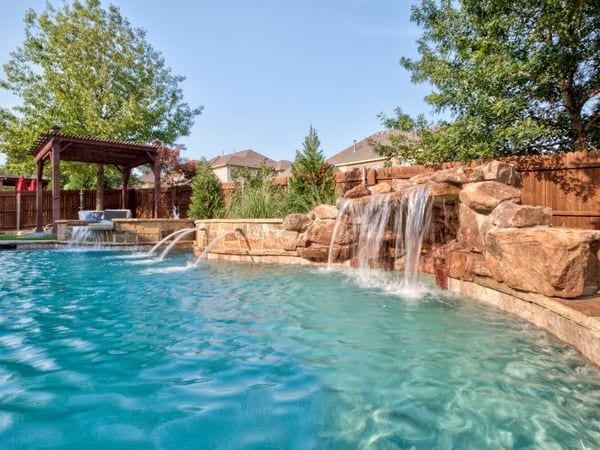
Spring and summer are known for their gorgeous temperatures which have everyone looking forward to when the pool is open. Spending your days floating in the crystal clear waters is a dream but, unfortunately, inclement weather can have everyone running inside. While we usually associate rain with the poor pool conditions did you know that sunny weather can take its toll too? The dedicated team at Liquidus Pool Services has the scoop on how the different types of weather can affect your pool.
Heavy Rainfall
The spring and summer months are known for their harsh storms that often bring heavy rain. For pool owners, long intervals of rain are often the sign to get out their maintenance kits. Heavy rainfall will quickly dilute a pool and lower its chlorine levels. Rain can carry bacteria, dirt, and grime which is set loose in your pool as soon as it hits the water. Your chlorine quickly jumps into action and combats these pollutants, keeping your pool clean. As more chlorine is used to negate the effects of the rainwater, the levels of active chlorine decrease.
After a heavy rainstorm, it is important to check the chemical levels of your pool and to adjust accordingly. Also, make sure to check the skimmer and filter for any debris that may have become lodged there.
Sunny Weather
There will be a lot of swimmers ready to jump into your pool during the nice sunny days of the summer. While sunny weather is perfect for swimmers, it can have some slight negative effects on your pool. The UV rays of the sun can kill the chlorine, dropping the levels and making those in the pool not as efficient. This is why it is highly recommended that the chemical levels of your pool are checked daily during the pool season to make sure that they are optimal.
It is also important to note during the summer months, that the chances of algae are higher due to the warm temperatures. Ensuring that proper maintenance is being practiced is one way to avoid an algae outbreak.
If there is a long span of particularly hot days, which is common in Texas, then make sure you check your pool’s water levels. Hot weather will cause your pool’s water to evaporate more quickly. While this only amounts to a few centimeters each day, over time this can have a profound impact. If your pool’s water is too low, you run the risk of groundwater pushing up on the foundation of the pool, pushing it out of place. Make sure you replace any lost water for that day as part of your daily pool maintenance routine.
Severe Weather
Texas is known for its strong storms that whip up wild winds, produce hail, and heavy rains. The hail and debris of these storms can cause damage to the sides of your pool, the pool deck, and water features such as fountains. If your pool has suffered structural damage due to a storm, your pool repair specialists can help!
Cold Weather
Cold weather during the winter months can cause freezing in your pool’s pipes or pool plumbing. Make sure to run the filtration system at least once a week to keep the water circulation going, and to protect the piping. Doing so will make the reopening process easier and prevent pool leaks and further damage.
Your Trusted Pool Maintenance and Repair Experts
Liquidus Pool Services understands that mother nature can be unkind to our swimming pools. That is why we offer efficient and timely pool maintenance and repair services to the hardworking individuals in DFW Metroplex. Allow us to handle the mess caused by mother nature so that you can focus on taking your weekend back by enjoying time with your family. Contact our team today for more information on our services or an estimate.
